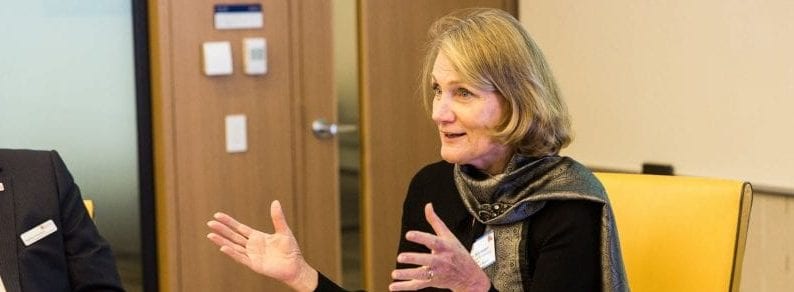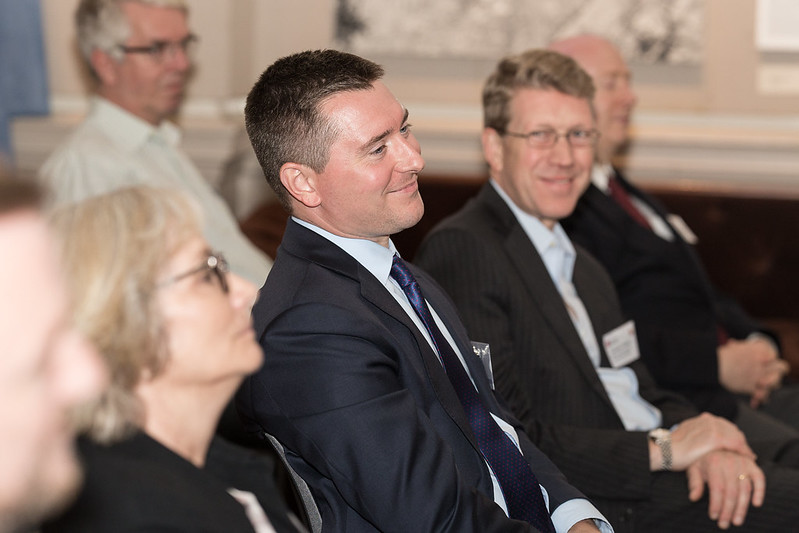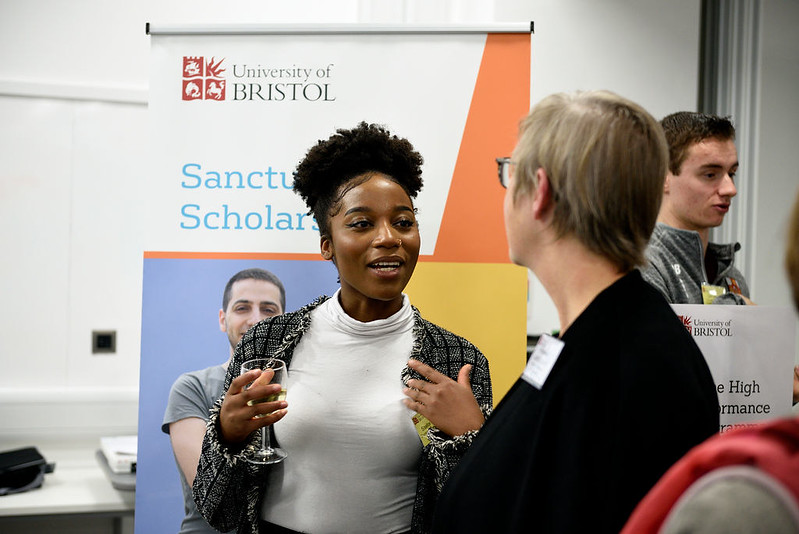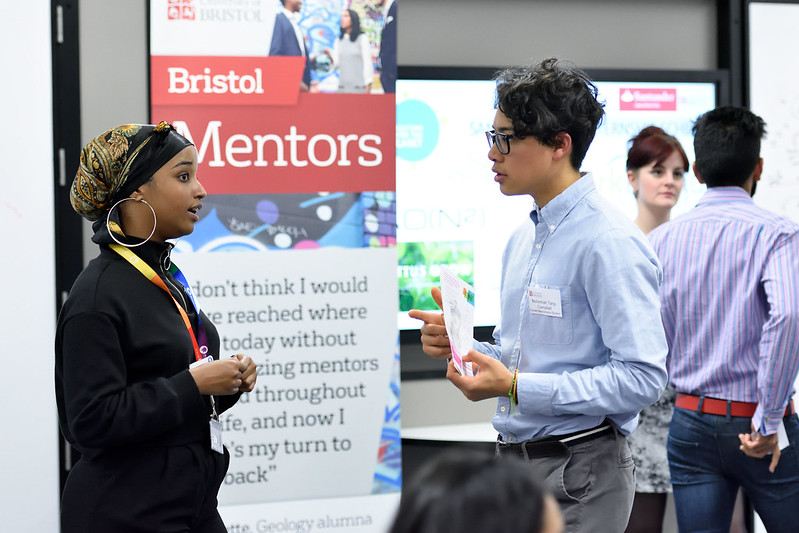Stephen O’Connor, Director of Development and Alumni Relations, talks to the BBC about Dr Bhikhu Patel (BA Hons Architecture 1973, Hon LLD 2006) and his wife Shashi’s £1 million gift towards Bristol’s transformational new campus at Temple Quarter.
Author: University of Bristol
US Foundation: Your alumni network
A year’s end perspective to our U.S-based alumni by Lesley Silvester, Chair University of Bristol Foundation.
The year’s end approaches, and typically drives an appraisal of the happenings of the past 12 months. In terms of the presence of the U.S. Foundation across America there is much to be happy about: first, the increase in financial support from the U.S.-based alumni community, and, equally important, the engagement of community members in alumni gatherings and the exchange of information between the University and its alumni not just in the U.S. but across the globe. A vital underpinning of such exchanges continues to be the desire of the University to both communicate Bristol’s strategic initiatives and, importantly, to openly discuss the key drivers of these initiatives.
In recent gatherings held by the Vice-Chancellor and his team, he discussed the strategic initiatives and challenges being focused on. In summary, they relate to increased diversity in the student body, internationalization, world-class research, campus redevelopment (with a huge focus on building community space), and the mental health well-being of students. These topics resonated with many of the alumni participating in the meetings; a number of us have long questioned why the University of Bristol of which we are proud has had a relatively low profile internationally. To me, what was particularly powerful in the Vice Chancellor’s discussions was the investment that the University is making in truly understanding the nature of its students’ mental well-being. Bristol is moving towards becoming a national leader in mental health research and remediation.
The relevance of these strategies and investments was additionally reinforced by four exchange students from Bristol, two of whom are studying at the University of California, Berkeley and two of whom are at Boston College. They shared some very interesting insights about their experiences and perspectives, which helped reinforce the path forward being articulated.
The Directors of the Foundation greatly appreciate those alumni who have become engaged with our efforts and those who are contributing to the University through the Foundation. Thank you! We would also like to thank the team at Bristol, under the leadership of Steve O’Connor, who have provided such terrific support of our aspirations in the U.S. to increase the impact of the Foundation.
Fulbright Scholarships
This year, the US Foundation have funded two Fulbright scholars thanks to generosity from alumni in the US.
One of these is Samantha Berman, pictured left, who recently graduated from Tufts University, with a BA in Environmental Science and Biology. She will pursue an MSc in Experimental Psychology, working to improve psychological patient care for individuals with cleft lip and/or palate, under the leadership of the University of Bristol’s Cleft Collective and the Person Perception and Person Knowledge Lab (PPPKL).
Personally and on behalf of the Directors of the U. S. Foundation I send very best wishes for the holidays and 2019. We look forward to seeing you and welcoming you at future events.
Bristol University on the road in the USA
A report on the bi-coastal visit to SF and NYC by Ely J Kahn
A University delegation, led by Vice-Chancellor Hugh Brady, traveled across the United States in September, visiting enthusiastic alumni gatherings in both San Francisco and New York City. The meetings included discussions with the Board of Directors of Bristol’s US-based American Foundation in California, and presentations in both cities by University students studying in the States on semester abroad programs. Both were highlighted by the Vice-Chancellor Brady’s reflections on the progress towards achieving the vision laid out in the University’s current strategic plan for greater internationalism, increased emphasis on attracting and retaining the best and brightest researchers, and campus redevelopment.
Dozens of Bristol graduates and their partners attended the two alumni meetings. The Vice-Chancellor was accompanied on the trip by Pro Vice-Chancellor Erik Lithander, who heads the University’s International Office, and by Stephen O’Connor, the University’s Dirrector of Development and Alumni Relations. He emphasized that a primary goal for his team is “to get a student body that replicates the world we live in.” Internationalization, he explained, meant that Bristol had to “move beyond A-levels”, and find additional avenues of access for worthy candidates, including those from the United States. “There’s never been more change in education,” the Vice-Chancellor added.
In San Francisco, at a US Foundation Board meeting led by Chair Lesley Silvester, the Vice-Chancellor said that one of the issues that had been “keeping me awake at night” over the past year was the mental health of university students. The Foundation Board agreed that it should be a priority, and approved a grant that will support a new Vice-Chancellor Fellowship in Mental Health and Well-Being in UK Universities, as well as funding for Widening Participation scholarships and a scholarship programme associated with the British Heart Foundation.
In New York, Vice-Chancellor Professor Hugh Brady expanded upon the issues that keep him awake, adding the uncertainty around the Brexit negotiations, and whether it will result in obstacles to the University’s ongoing efforts to attract the best European candidates, as well as the government’s review of higher education funding, and its potential impact on the Bristol budget.
We need your support, and your engagement,’ said Professor Hugh Brady.
Foundation Chair Lesley Silvester reiterated the need. “In San Francisco,” she said, “we saw the richness of the alumni network. Its benefits are powerful, the result of the community we’re trying to strengthen through the Foundation. It’s growing, but we want more — more Directors, more volunteers. Please join us.”
Benefactor’s event 2018
Bristol launches alumni mentoring scheme
The University of Bristol has launched its brand-new alumni mentoring initiative, which pairs current students with alumni to give them invaluable insights, advice and opportunities to support and shape their future ambitions.
The scheme aims to provide students with a relatable and relevant mentor who can offer practical guidance as they move towards life after University.
Alumni mentors come from a variety of life and career backgrounds, but all have a University of Bristol degree in common, and a wealth of experience which their student mentees will be able to draw from.
Over the course of the academic year, mentors will take part in six mentoring meetings, during which they’ll give realistic insights into industries which might be of interest and help to develop skills, set goals, identify opportunities and bolster confidence.
A reception was hosted at the Centre for Innovation and Entrepreneurship and gave students and alumni the chance to meet and get to know each other over food and drink. Guests also enjoyed a pub-style quiz, designed to get students and alumni mentors talking and working together in a fun and informal setting.
A talk by former student, Liberty Oberlander, shared how mentoring helped her get her to where she is today, as well as revealing her top tips to students.
Kim Slim, Law (LLB), 2016
Having grown up and gone to school in London, Kim was originally drawn to the University because of its world-class reputation and diversity of opportunities on offer outside of academic life, all set within the beautiful city of Bristol. He now works for the Civil Service in the Grenfell Tower Response Team.
How did you end up in your current career?
When I finished studying, I wanted to work in media (having helped run Burst Radio during my degree). While searching for jobs, I came across direct appointments to the Civil Service and applied for a job as a graduate PA at the Department for Education.
After six months I was offered a job in one of the education ministers’ offices to work at delivering ministerial priorities over a number of educational policies.
I then moved to work on policy development at the Ministry of Housing, Communities and Local Government, working on rehousing survivors of the Grenfell Tower fire. This August I started a new role leading our team which works directly with Grenfell survivors to support their recovery.
I hope I can make a real difference to people’s lives, as Roosevelt said, ‘to have the chance to work hard at work worth doing’.
What drew you to be a student mentor?
This was something I would have really valued when I was a student – I never had any connections, or any sort of personal advice about careers in the sector I was interested in, so I’d love to be able to help in any way I can to get students to where they want to be.
What support/guidance do you want to give to your mentor?
Explore whatever opportunities are on offer to get a real taste for what you’re interested in. Don’t settle for the first thing you think of – explore what’s out there and get a feel for what fits with you.
What advice would you give to your younger self?
Make the most out of first year! I discovered all my favourite extra-curricular activities in my final year and I wish I had taken advantage of all that was on offer right from the beginning.
_______________________________________________________________
Further information
The mentoring scheme is a joint project between the University’s Development and Alumni Relations team and Careers Service. The University is extremely grateful to the alumni who’ve volunteered their time and experience to be part of this programme.
Inter-UK University Trivia Challenge Match, October 11 2018
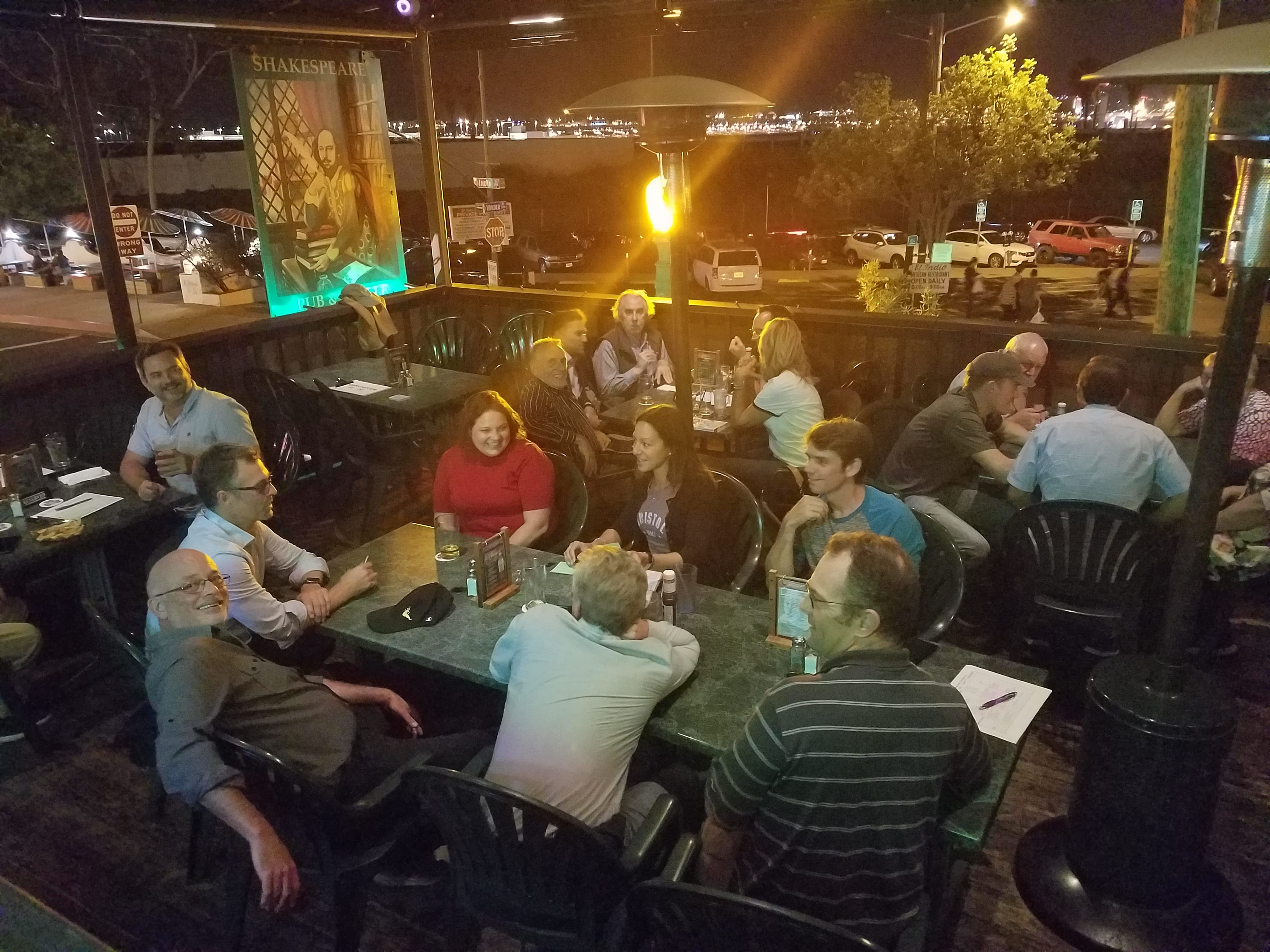 Brian Beeston, Birmingham, 1963
Brian Beeston, Birmingham, 1963
A most enjoyable evening was had by all, when teams from Bangor, Birmingham, Bristol, Imperial College, Leeds, Liverpool and Manchester plus representatives from Nottingham, Sheffield and York, gathered at The Shakespeare Pub in San Diego for the First Inter-UK University Trivia Challenge Match on Thursday, October 11th. Organizer and Quiz Master, Brian Beeston, set some fiendishly difficult and some relatively easy questions to test everyone’s wits. The match was very closely fought and came down to the last question, at which time Bristol was leading with 40 points, Imperial were second with 38 and Manchester third with 31.
On the last question, teams could “bet” up to half the points they had accumulated so far, and collect those points if they were closest to the correct answer (or lose them if they were not). The final question was “What is the distance, as the crow flies, from Cardiff, CA and Cardiff, Wales”. The correct answer is 5,365 miles. Imperial was closest with 5,200 miles, and having “bet” 19 points, ended up with 57 points. Bristol chose not to risk any points, so ended up with 40 points, and Manchester risked 11 points and ended up with 20 points.
Participants agreed that they would like to have a repeat match in the Spring and the Organizer asked for offers of help to run the next Challenge Match. Thanks to all who participated in a most enjoyable evening, especially Anita Beeston for keeping score so excellently and for Tara Beeston for collecting the questions as we went along. And to The Shakespeare Pub for hosting the event.
See you at the next Challenge Match.
World mental health day 2018: A message from the Vice-Chancellor to alumni
For World Mental Health day 2018, Professor Hugh Brady, Vice-Chancellor and President, talks about the University’s commitment to student wellbeing.
As the new academic year commences, the wellbeing of our students remains firmly at the forefront of all our minds following a number of student deaths by suicide over the past two years. Every student death is a tragedy in its own right. To have a number in quick succession tears at the very heart of our University and our thoughts remain with their families and friends.
Mental health is fast emerging as the single biggest public health issue affecting young people today, both here in the UK and globally. The exact causes of student mental health problems are difficult to determine, but there can be many contributing factors on a personal and societal level.
There currently aren’t any high-quality research data sets on levels of mental health problems amongst UK students. Estimates vary widely between surveys depending on methodology and response rates.
In a recent survey of 14 UK universities conducted by Alterline, including Bristol, over 60% of responders reported having suffered a mental health issue at some stage during their lives and an alarming percentage of students reported anxiety, depression, suicidal thoughts, self-harm or attempted suicide. Similar statistics have been reported in countries as different as China and the USA. Over half of responders had experienced suicidal thoughts at some point in their lives and up to 11% reported having made a suicide attempt – a figure considerably more than other estimates in this age group and perhaps reflecting low response rates; only 8% of Bristol students responded to the survey.
In a recent analysis of student patients in 12 medical practices in England, 8% had records of depression and 7% anxiety.
While increased awareness of mental health and a refreshing willingness to talk openly about mental health issues may be contributing to these alarming statistics, there is compelling evidence that we are witnessing an unprecedented and relentless surge in the number of young people presenting with mental health issues.
The causes are unclear and will take time to tease out. Putative factors include increased academic pressure, concerns about employment, changing patterns of drug and alcohol use, student debt, and concerns about geopolitics and climate change. Many of us worry that the sheer volume, content and pressures of social media may also be a factor. In this cyber world, there is no longer time to daydream, to muse or to have a bad hair day without getting judged, trolled or abused.
The scale of the challenge is forcing us to re-evaluate every aspect of our student support systems; to challenge established practices; to examine innovations elsewhere in the sector and beyond; to make major changes and significant additional investments where warranted; and to monitor the impact of our interventions with a view to continual improvement.
Here in Bristol we are taking every step we can to work with our students to help them build the life skills and resilience to cope with these pressures, and to identify vulnerable students as early as possible so that we can support them through their mental health issues.
Simply put, it is our view that mental health is everybody’s business at our University and we are implementing a university-wide approach to student (and indeed staff) wellbeing for the coming academic year 2018-19 which will see us roll-out a suite of measures that includes:
- better supporting students during their transition into our University, including a new opt-in policy which encourages students to allow us to include a third party, nominated by them, in discussions on their mental or physical health where we have significant concerns. We are definitively not in loco parentis and our students are adult learners with all of the rights of privacy enjoyed by other adult citizens. However, many students experiencing difficulties can benefit hugely from the early involvement of a parent, former teacher, friend or guardian – involvement that requires the student’s unequivocal consent. We are delighted that in the first week of registrations 94 per cent of our students, both those new to Bristol and those returning, have signed up to this new common-sense policy. It seems a simple step but one that could make a real difference in the coming year;
- embedding personal development, wellbeing and resilience in the curriculum through our new Bristol Futures curriculum initiative which will be available to all taught students across the University across all disciplines and stages of study;
- introducing a team of full-time professional staff in our halls of residence (Residential Life Teams) who will be rostered on a 24/7/365 basis and whose full-time job is to work with our established teams of live-in student peer mentors on community building and the early identification and support of vulnerable students;
- introducing a similar team of dedicated full-time professional staff into our academic schools and departments (Student Wellbeing Advisers) who will work alongside our personal and senior tutors;
- stronger partnership with our Students’ Union and our Division of Sports, Exercise and Health to foster greater student engagement with our academic societies, performance groups and sports clubs;
- bolstering our triage, GP and Counselling Services so we can treat urgent cases on the same day if necessary while channelling less urgent cases to appropriate counselling, life-style, mindfulness and exercise programmes;
- strengthening partnerships with external providers such as the NHS, Public Health England and the charitable sector so students in difficulty can be referred and treated promptly. Universities have a key role to play in the early identification and support of vulnerable students; however, we simply cannot and should not be expected to serve as a replacement for the NHS. For too long, mental health has been the poor relation to other NHS services – this must change;
- creating a strong focus on employability with a view to supporting our students during their second challenging transition – moving from student life to the workforce after graduation;
- the introduction of an annual student and staff survey to evaluate the impact of the initiatives we are introducing and to learn how we can continue to improve the support we provide;
- finally, an end-to-end review of our University policies and communications in difficult areas such as withdrawal and fitness-to-study to ensure that our students are supported appropriately by the University, their parents and others during such challenging events.
As a world-leading research-intensive university we are taking an evidence-based approach to inform our practices and to monitor outcomes. We are also building further research capacity in the area of student mental health through our Elizabeth Blackwell (Health Research) Institute.
This programme clearly involves multiple components – many of which overlap – and must be underpinned by easily understood care pathways and communications channels. I have established a Vice-Chancellor’s Taskforce to coordinate our efforts across the University which, in turn, is supported by an Expert Advisory Panel of national and international experts.
I am very aware and indeed encouraged by the interest of so many alumni and friends in the measures we are taking to address the unprecedented challenge of mental health. I have received many passionate letters of support and others seeking to understand the issues facing us and the rationale for change. Your input and voice is greatly appreciated. You are our finest ambassadors and I want you to be proud of the care and support we provide to those students who follow in your footsteps.
For some alumni the replacement of the traditional warden system with a team of professional staff is a cause for concern. The warden system served the University well for many years and I should stress that our recent wardens have been valued supporters and mentors for our students. The reality, however, is that our University is now much larger than when the warden system was established (currently c23,000 students); its student body is much more diverse in terms of gender, nationality and socioeconomic background; the vast majority of academic mentoring takes place within our academic schools and departments; students only live in halls during first year, if at all; and the challenges facing our students in areas such as mental health, sexuality, drug and alcohol use are of a scale and complexity that significant change is required.
As a parent, clinician and Vice-Chancellor, I have to believe that in 2018 a team of full-time professional staff, rostered on a 24/7 basis, experienced in supporting young people through a range of complex difficulties, and constantly updating their skills through bespoke training and development opportunities is more appropriate than the traditional part-time warden model. That is not to say that there will not be a central role for our many exceptional academic staff who, in addition to their world-class academic activities, also generously give their time to support the holistic development of our students.
Throughout the last two years, we have often found ourselves in the national spotlight when it comes to student wellbeing because of a number of tragic student deaths by suicide. At times we have felt like a lightning rod for this issue which sadly affects all UK universities and the wider community. As young people are especially vulnerable to suicide coverage we take the reporting of it very seriously. Significant guidelines have been developed for media around the reporting of these issues, from agencies such as the Samaritans, and we work hard to be sensitive towards those involved.
The wellbeing of our students is a key priority at Bristol, and we are proactively investing time and money to support and help our students in any way that we can. There is a more detailed description of everything we are doing for our students available online for you to read, which I hope shows our commitment to them and their time at university.
I hope that I can count on your continued support as we strive to get ahead of this challenging problem and, indeed, to become sector leaders in terms of our practice and the research underpinning it.
Your sincerely
Hugh Brady
Vice-Chancellor
Learn more about the health and wellbeing services available to our students.
What can be done to help mental health and wellbeing in young adults?
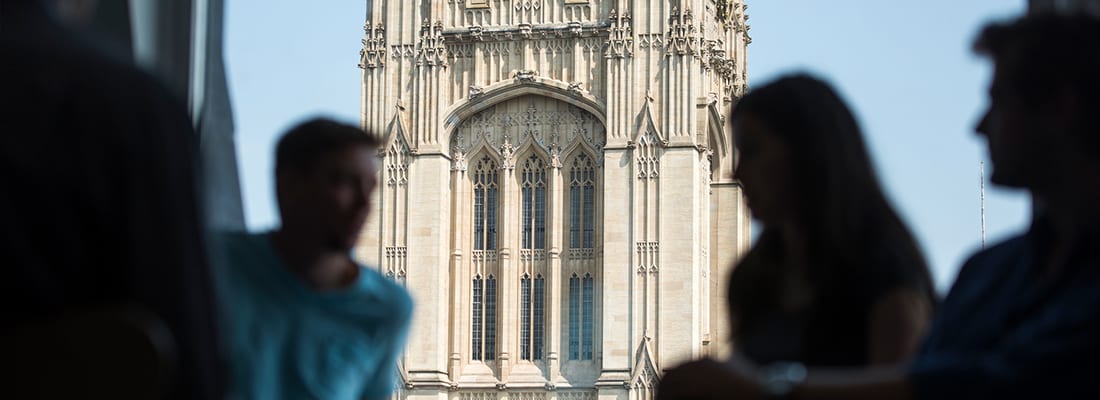 Alumna Elaine Sneller (LLB 1988), a Psychodynamic Psychotherapist, takes a look at the current crisis in mental health amongst young people.
Alumna Elaine Sneller (LLB 1988), a Psychodynamic Psychotherapist, takes a look at the current crisis in mental health amongst young people.
As someone who works in the field of mental health and a parent with children at or approaching university, the crisis in students’ mental wellbeing greatly concerns me. It is a complex issue with no easy answers or solutions but deserves to be thought and talked about.
From my own experience of working with A level students and having held a school counsellor role for four years, I believe we are not doing enough to attend to the mental health of our young people. Most mental health issues begin well before the age of 18, although they often go undiagnosed. Pressures start before young people reach university; academic performance, school league tables, anxiety about a career path and a need to be the perfect student with an enviable social life, can lead young people to feel as if they are not good enough.
Young people often feel under pressure to constantly succeed with no room to try things and fail, to experiment with different looks, music or friends and parents seem to struggle to support their children in this normal experimentation period. Sometimes they fail to talk to their children in a considered and open way about the choices their children make and the possible consequences. Many parents are under enormous pressure themselves, working long hours to make ends meet and keep their households running. I fear this lack of communication and understanding and confusion between young people and parents around issues such as the benefits-v-pitfalls of social media, gaming and other on-line activity, concerns about body image and causes of self-harm can be a contributory factor in young people not getting the support they need to enjoy robust mental health.
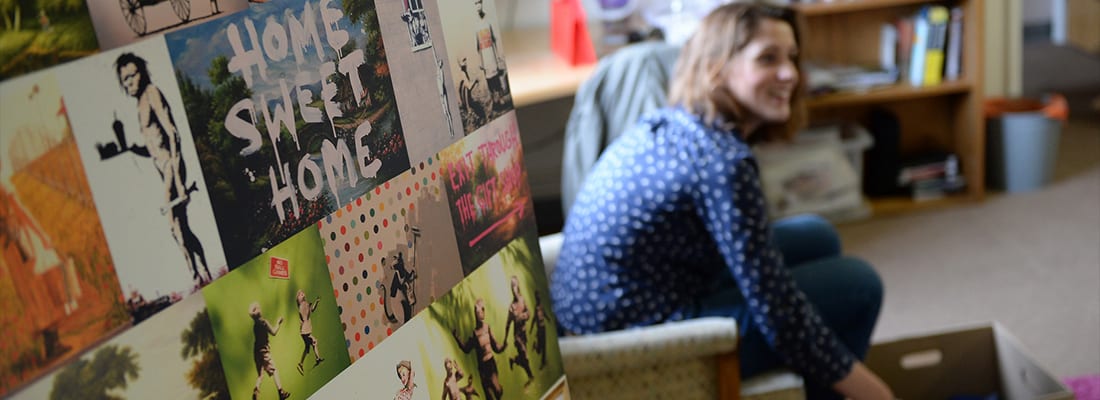 It is easy for social media to be a scapegoat for all the problems of young people, but it is a complicated subject. Social media can be a useful channel for information and connection, but it can also be a source of misinformation and scaremongering and a means of putting people together with a shared negative agenda. Young people are often not sufficiently educated, helped and supported by their parents or schools around access to social media, or given an opportunity to discuss their on-line habits and what might be helpful and healthy and what might be harmful on-line both in terms of time and content. Parents and schools can play a big role in this and encourage healthy on-line habits and social media use.
It is easy for social media to be a scapegoat for all the problems of young people, but it is a complicated subject. Social media can be a useful channel for information and connection, but it can also be a source of misinformation and scaremongering and a means of putting people together with a shared negative agenda. Young people are often not sufficiently educated, helped and supported by their parents or schools around access to social media, or given an opportunity to discuss their on-line habits and what might be helpful and healthy and what might be harmful on-line both in terms of time and content. Parents and schools can play a big role in this and encourage healthy on-line habits and social media use.
There seems to be a continuing stereotype of the monosyllabic and recalcitrant teenager but, in my experience, if young people believe and trust someone is going to listen to them and not judge or ridicule, many are very willing to talk about what is going on for them and this can be an important step in improving their mental wellbeing.
So why are we seeing mental health problems presenting themselves at universities in particular? Again, this is a question without a simple answer. As I mentioned, mental health problems usually begin before a young person reaches 18 and often the problem has not come to anyone’s attention, let alone been diagnosed. So when a vulnerable young person leaves home they may be leaving behind a supportive network, or at least a familiar situation they have relied and this can escalate a pre-existing problem. They may not feel they have any one to talk to at university and may be reluctant to tell those at home the problems or loneliness they are facing particularly if there has been a big celebration, sacrifice or financial pressure in order for the young person to get to university. For many students this can be stressful and exposing and worse for those with already fragile mental health. Leaving parents and friends behind can highlight a young person’s lack of resilience and insecure sense of self.
On the other hand, some students may find university a place where they are able to get more support than at home if they are struggling with their mental health. They may not previously have considered their own mental health and it may be the first time they have thought or heard of the concept. They may find mental health is more openly discussed and considered at university, there may be more space to think about and less shame in discussing their concerns about their own mental health and self-referral to university counselling an accessible way to access help and manage their problems. This is what we should be aiming for all universities to provide for students.
Some students have been lucky enough to have parents who have done everything for them but they can then struggle with the complexities of life on their own. Conversely, students who have been left to their own devices and appear to be more independent and self-sufficient may find they have not been given the resources to manage the complexities of life on their own.
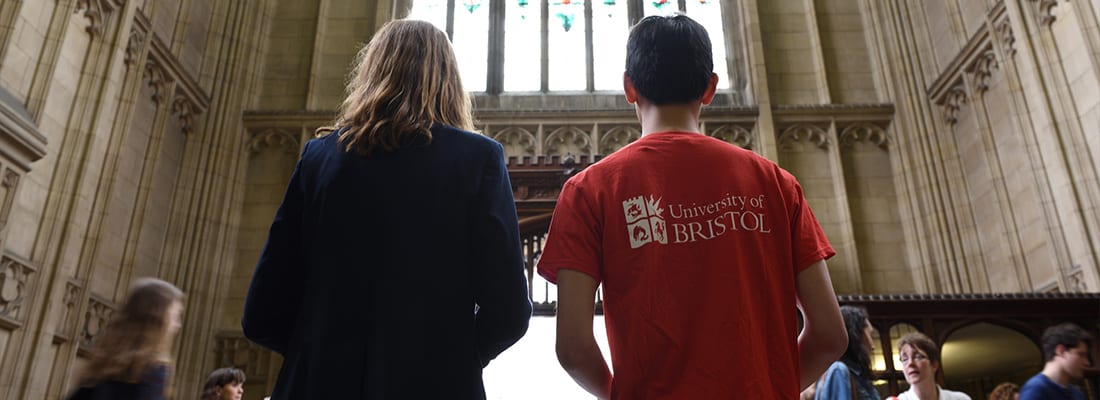 What can be done? As a start, as intimated before, it is essential for all parents to have an open dialogue with their children and teenagers. I cannot emphasis how important this is. I would make it compulsory! Make time for them, ask them about how they’re feeling and check in with them regularly, right from the age they can talk (maybe even before), up to when they go to university and beyond. Normalise talking about emotions and share your own struggles and experiences of university or life as a young adult. Avoid judging and support them in trying and failing. Tried and tested practical interventions such as getting enough fresh air and exercise, eating well, connecting within their community and enjoying nature really do make a difference. Easier said than done of course, but leading by example can help.
What can be done? As a start, as intimated before, it is essential for all parents to have an open dialogue with their children and teenagers. I cannot emphasis how important this is. I would make it compulsory! Make time for them, ask them about how they’re feeling and check in with them regularly, right from the age they can talk (maybe even before), up to when they go to university and beyond. Normalise talking about emotions and share your own struggles and experiences of university or life as a young adult. Avoid judging and support them in trying and failing. Tried and tested practical interventions such as getting enough fresh air and exercise, eating well, connecting within their community and enjoying nature really do make a difference. Easier said than done of course, but leading by example can help.
As far as universities are concerned, they need to make mental wellbeing resources more accessible and available and improve and promote the resources they do provide.
A recent BBC report found an increase of 24% in the number of under-12s being prescribed anti-depressants in the last three years. It is clear that this issue is not beginning at university and needs to be tackled at all ages and educational levels. The average waiting time for general access to Child and Adolescent Mental Health Services (CAMHS) is now twelve weeks, and most young people referred to CAMHS will receive a diagnosis and no treatment as most young people will not reach the CAMHS threshold for treatment although they may appear, especially to their friends and family to be very unwell. There is insufficient funding for CAHMS to both diagnose and to then treat all those who need treatment. If they have not received treatment within CAHMS, and few young people do, they may progress to university with their problems unaddressed. If they have had access to CAHMS, they may find there is an awkward and insufficient transition from CAHMS to adult mental health services and universities end up being saddled with the problem and trying to fill a poorly defined space in between.
When funding cuts to mental health services lead to GPs prescribing at this level, it is clearly a growing societal concern. We all need to work together to address the issue in a holistic way and not simply look for scapegoats. Nor must we respond to complex questions with simplistic answers.
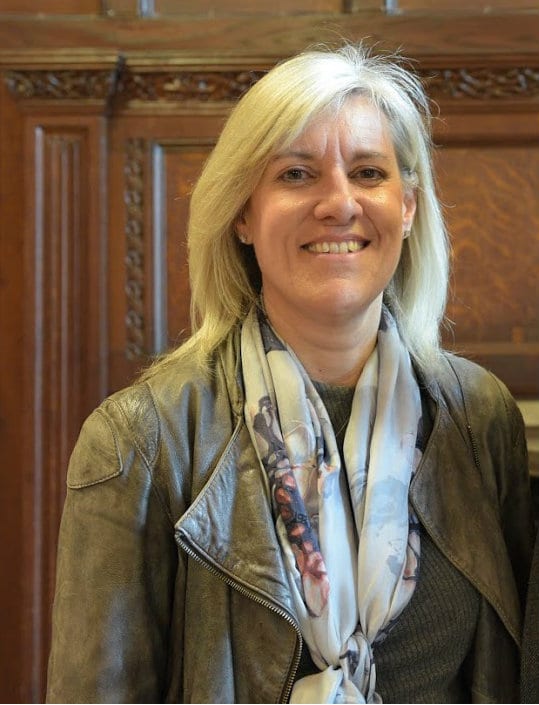 Elaine Sneller graduated from Bristol in 1988 and went on to become a solicitor working in Property Law. She then trained as a barrister and worked in property, family and criminal law for over ten years, where many of the young people she represented suffered from drug and alcohol and mental health problems. Elaine started wondering if she would be better placed working directly with people who were struggling, rather than representing them in the courtroom and after working in drug and alcohol rehabilitation for four years, retrained as a psychotherapist, graduating in 2013.
Elaine Sneller graduated from Bristol in 1988 and went on to become a solicitor working in Property Law. She then trained as a barrister and worked in property, family and criminal law for over ten years, where many of the young people she represented suffered from drug and alcohol and mental health problems. Elaine started wondering if she would be better placed working directly with people who were struggling, rather than representing them in the courtroom and after working in drug and alcohol rehabilitation for four years, retrained as a psychotherapist, graduating in 2013.
Elaine and her husband Perry Noble feel so strongly about the issue of mental health that they are supporting PhD student Jazz Croft in her work in this area. Jazz is a PhD candidate at the Centre for Academic Mental Health at Bristol. She is working with the ‘Children of the 90s‘ group (Avon Longitudinal Study of Parents and Children) for her research. Jazz is looking at childhood trauma, psychotic experiences and proposed cognitive mechanisms that may mediate their relationship.
You’re supporting brilliance from every background
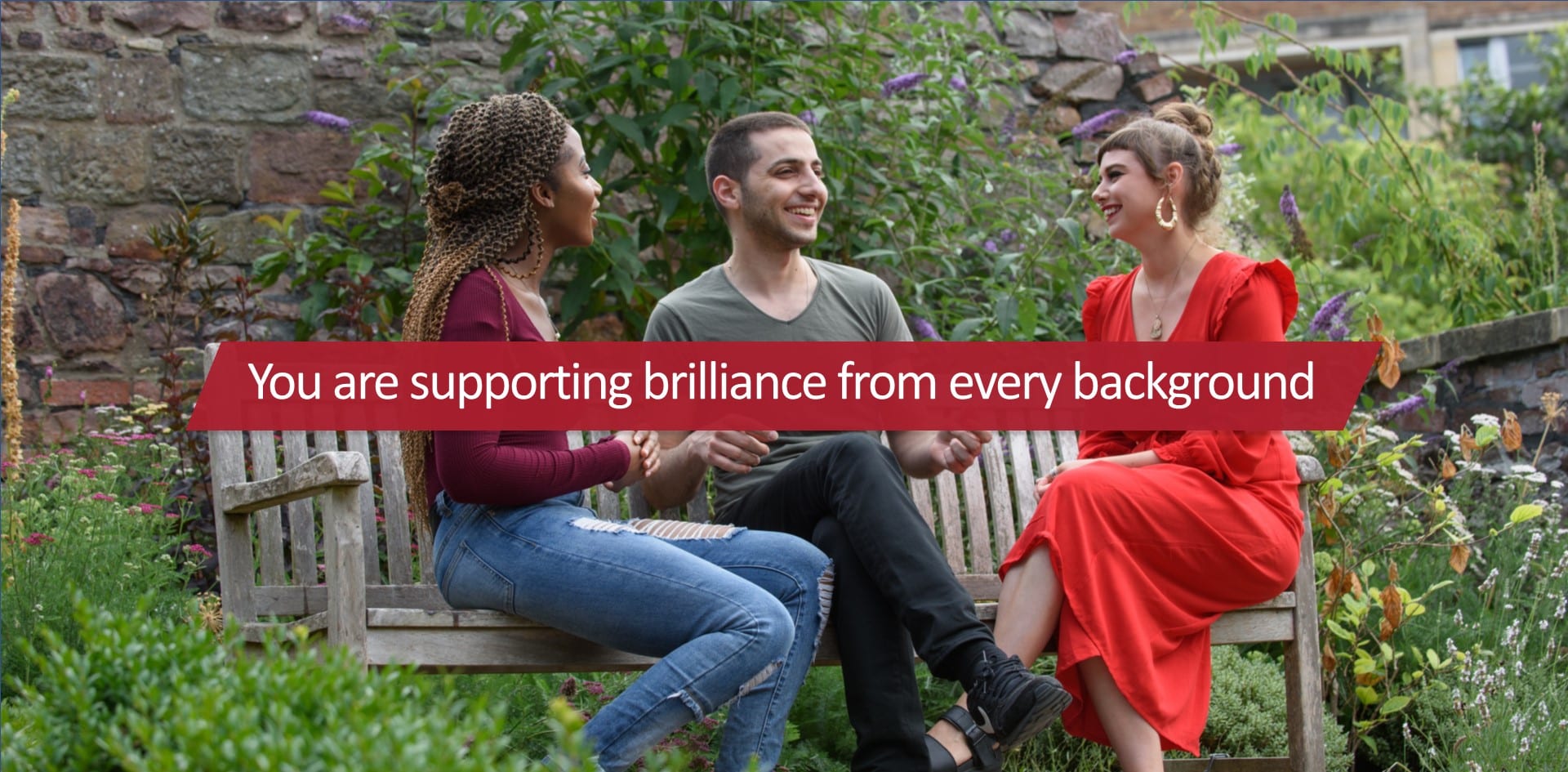
Dr Katie Bales, Lecturer in Law, Working Group member for Sanctuary Scholarships, talks about what this programme means for students at Bristol from the asylum-seeking and refugee communities.
We’re currently in the midst of the highest levels of displacement on record, with nearly 22.5 million refugees globally, and over half of these people are under the age of 18. They’ve fled war, famine, and natural disasters. These journeys don’t end once people arrive in the UK – instead people face a new series of hardships and hurdles as they struggle to get their life back on track. Too young, too bright to not have their potential realised, continuing their education can be incredibly difficult.
The financial barrier to education is hard to overcome. These days, if you want to go into any profession, a degree is an essential requirement. The Sanctuary Scholarship scheme here at Bristol helps refugee and asylum-seeking students overcome those roadblocks. And a degree gives these students so many more options – it gives them the foundations of a bright future. This scheme makes me so proud to teach here, and it makes me really proud to know so many of our alumni and friends have donated to support the scheme.
These donations have removed the financial barrier to study for these students. With that gone, a new set of possibilities opens up and students are able to re-imagine their futures. Alumni funding shows our students that they’re part of a supportive community. It shows our students that alumni understand the challenges and what Bristol has to offer – they’re giving someone the same opportunity they once had.
And it’s an opportunity our scholarship students are making the most of. One of our foundation students has just been offered an undergraduate place here on the Sanctuary Scholarship scheme. This student is always in the library studying. They’ve received some upsetting and traumatic news about what’s happening in their country of origin, but they’ve taken it in their stride, and focused on their studies.
Master’s student and Sanctuary Scholarship recipient Sarmad Ozan told me what getting the scholarship meant to him: ‘It allowed me to continue with my studies even when I was told I couldn’t because of my status in the UK. I’ve gained so much knowledge from the University even outside my course. I’ve played basketball for the University and attended careers fairs and skills workshops. I’m so grateful I was able to continue on to postgraduate education and I’ve grown in confidence as a result of the opportunities this scholarship has given me.’
It makes me feel proud that as a community we’ve established the Sanctuary Scholarship scheme. Stella Ogunlade, undergraduate Psychology student, volunteers with the scheme. This is what she says about her role: ‘I decided to become a volunteer representative with the scheme because I was interested in how it all worked. I wanted to be the student that scholars could speak to when they were having problems. I wanted to understand the barriers the scholars had to overcome and how the scholarship has provided them with the opportunity to continue on with their studies.’
The Sanctuary Scholarship scheme is truly life-changing for these students and it makes me really appreciate our alumni and supporters – I think it shows the strength of the Bristol community and it makes me proud to teach here.
_____________________________________________
Thank you for keeping Bristol brilliant. Click here to return to our Benefactor’s report 2017/18.
You’re creating tomorrow’s research leaders
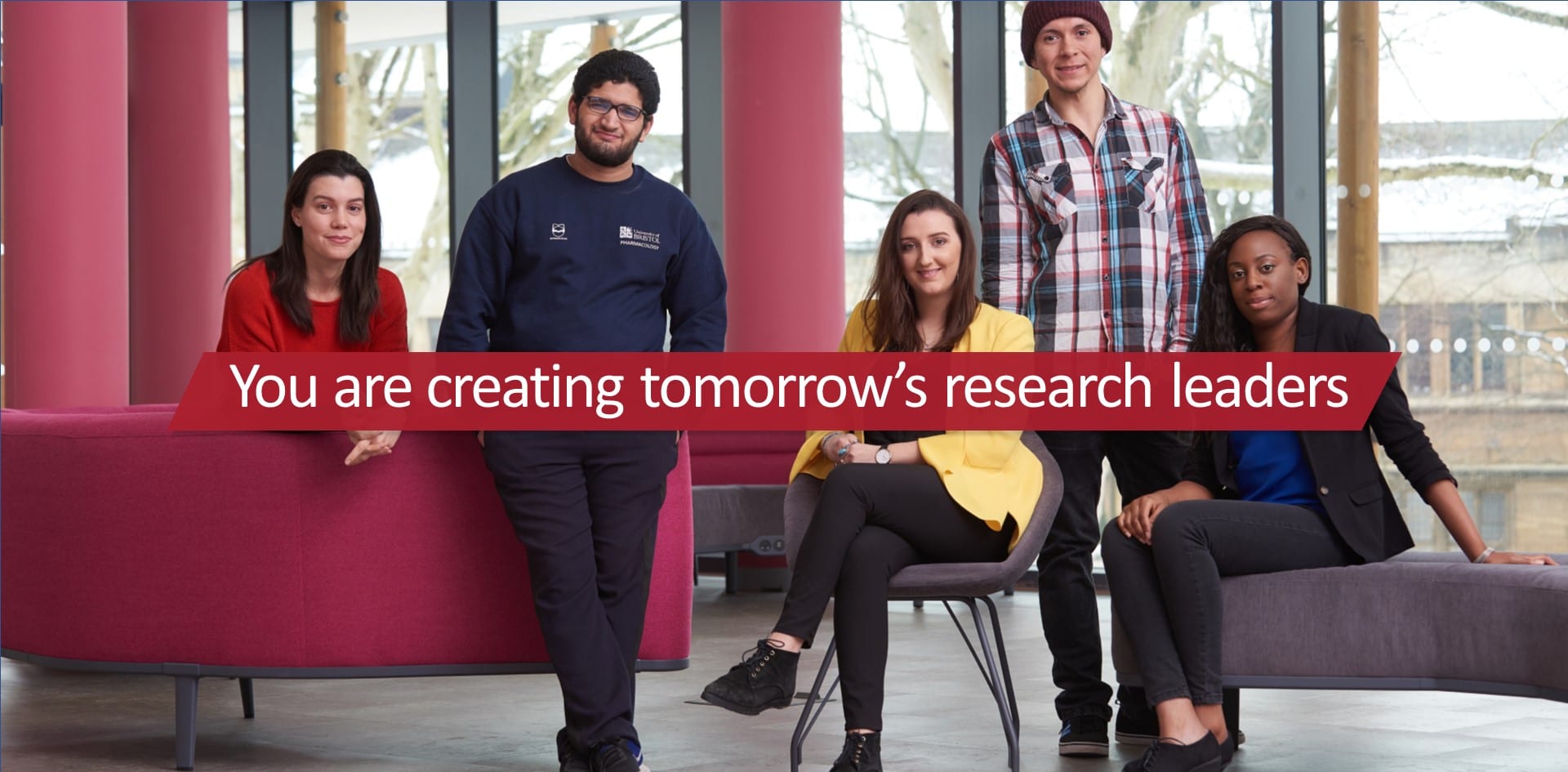 Malu Villela Garcia, Vice-Chancellor’s Fellow, explains how being funded philanthropically has enabled her to carry out her research into the growth of mission-led businesses.
Malu Villela Garcia, Vice-Chancellor’s Fellow, explains how being funded philanthropically has enabled her to carry out her research into the growth of mission-led businesses.
I’m trying to find ways to address the inequalities we are facing in society across the globe, having been inspired by my previous research with the Friends of the Amazon Network in Sao Paulo, Brazil. This work focused on establishing and maintaining sustainable economies in the Amazon and was part of a multi-stakeholder network approach. We’ve come to a point where the planet is already at its limit and the gap between rich and poor is reaching an unprecedented scale. We urgently need to work towards sustainability and inclusion. As part of my work at Bristol, as a Vice-Chancellor’s Fellow, I’m trying to make sense of these challenges and make a positive contribution towards addressing them.
As the lines between sectors are becoming increasingly blurred, we can see new organisational models emerging. These organisations are trying to bring social and environmental goals to the core of their operations. The objectives of these new models are to make a more meaningful contribution to society, one that goes beyond mere profit generation. There are already a large number of companies – such as Patagonia and Natura, as well as a lot of small and medium enterprises – embracing this ethos. My current research looks at how social networks are influencing the growth of these mission-led businesses and social enterprises.
I’m examining these influencing networks on a city level. Bristol has an existing business ethics community that is discussing how to work with local producers and practitioners. The city is an innovation hub as well as a creative one, the first social enterprise city in the UK, and a former European Green Capital. Bristol also won the Global Smart City Award in 2018, beating competition from the likes of Barcelona, Dubai, New York and Singapore. There are also two big universities here as well as leadership in hightech developments. This combination of factors makes Bristol an ideal place for me to conduct my research.
It really wouldn’t have been possible for me to come to Bristol and make the most of this Vice-Chancellor’s Fellowship without the help of donations from alumni and friends. I’m so grateful for this opportunity. Donors have taken a leap of faith placing their trust in my research and demonstrating belief in my potential. Ensuring a diversity of views and thoughts will be essential to generating innovative solutions to our global challenges.
These Fellowships were established to help early career researchers like me advance their careers and to address society’s grand challenges. I’m so proud to be part of the first cohort, as these Fellowships highlight the spirit of innovation and collaboration that Bristol is renowned for and that’s taking us into the future. I truly encourage donors to keep giving, because it enables outstanding young researchers from all backgrounds and parts of the world to pursue their own specialist areas of research. What better way to help keep Bristol a vibrant, diverse academic community and a worldclass university?
_____________________________________________
Thank you for keeping Bristol brilliant. Click here to return to our Benefactor’s report 2017/18.

